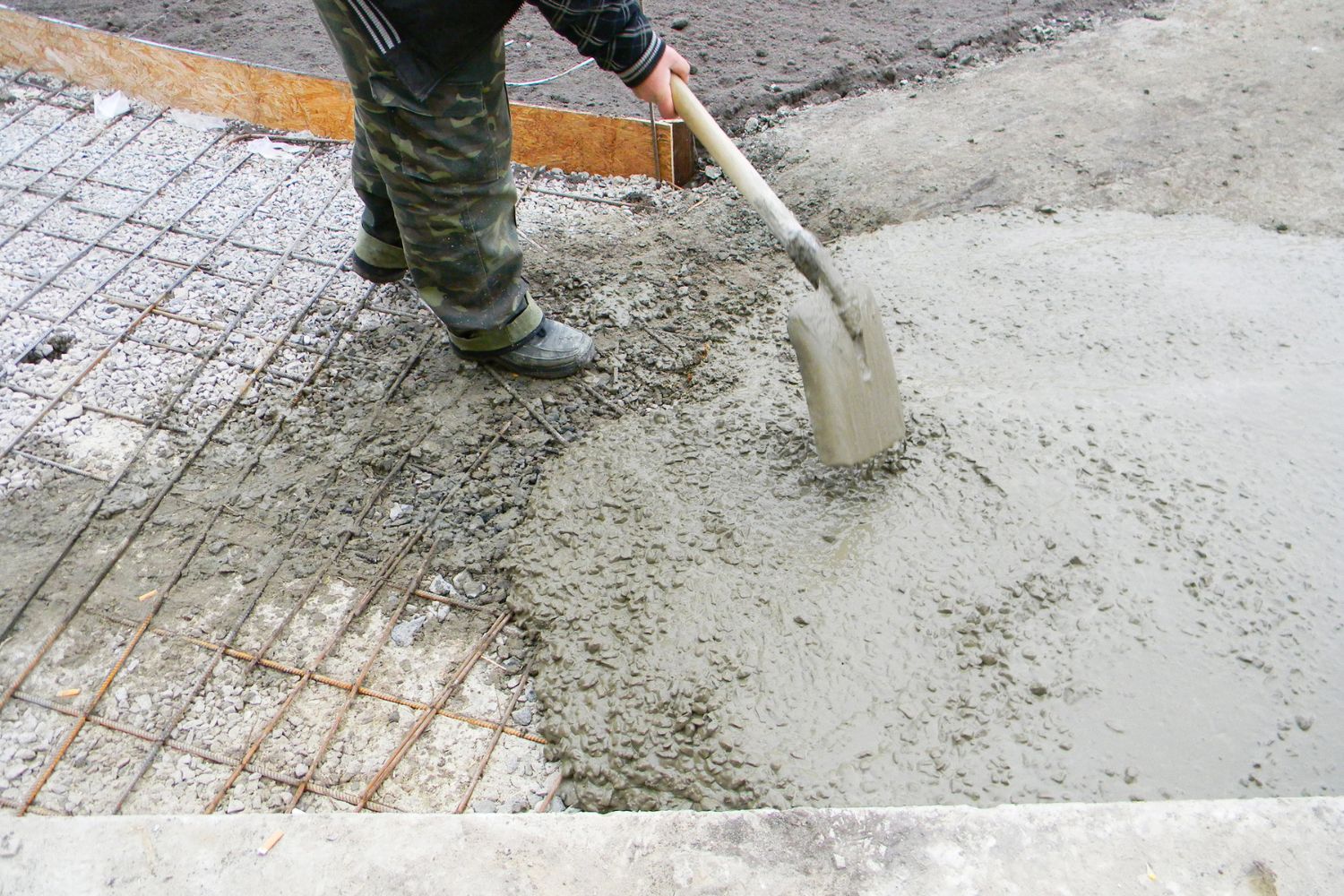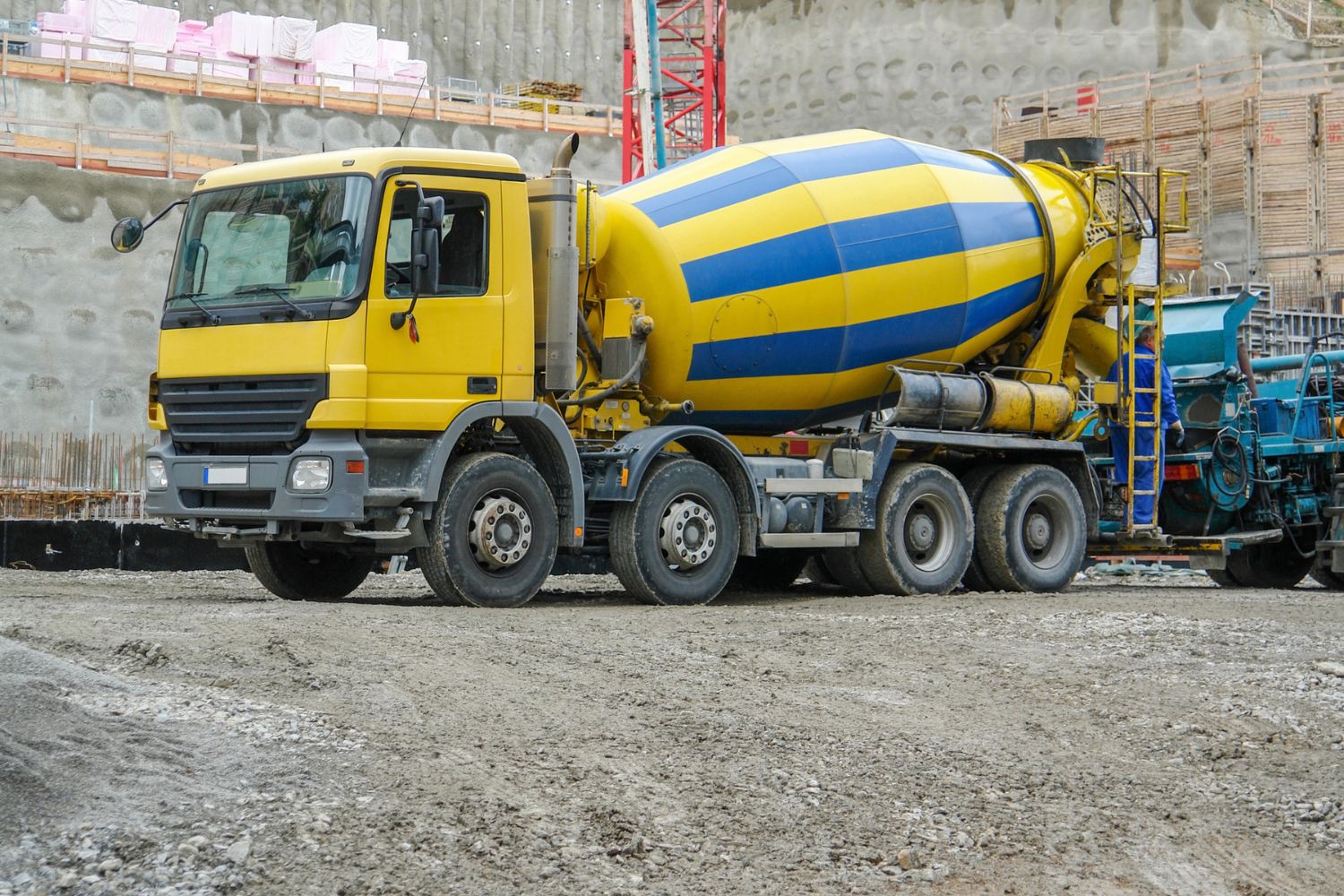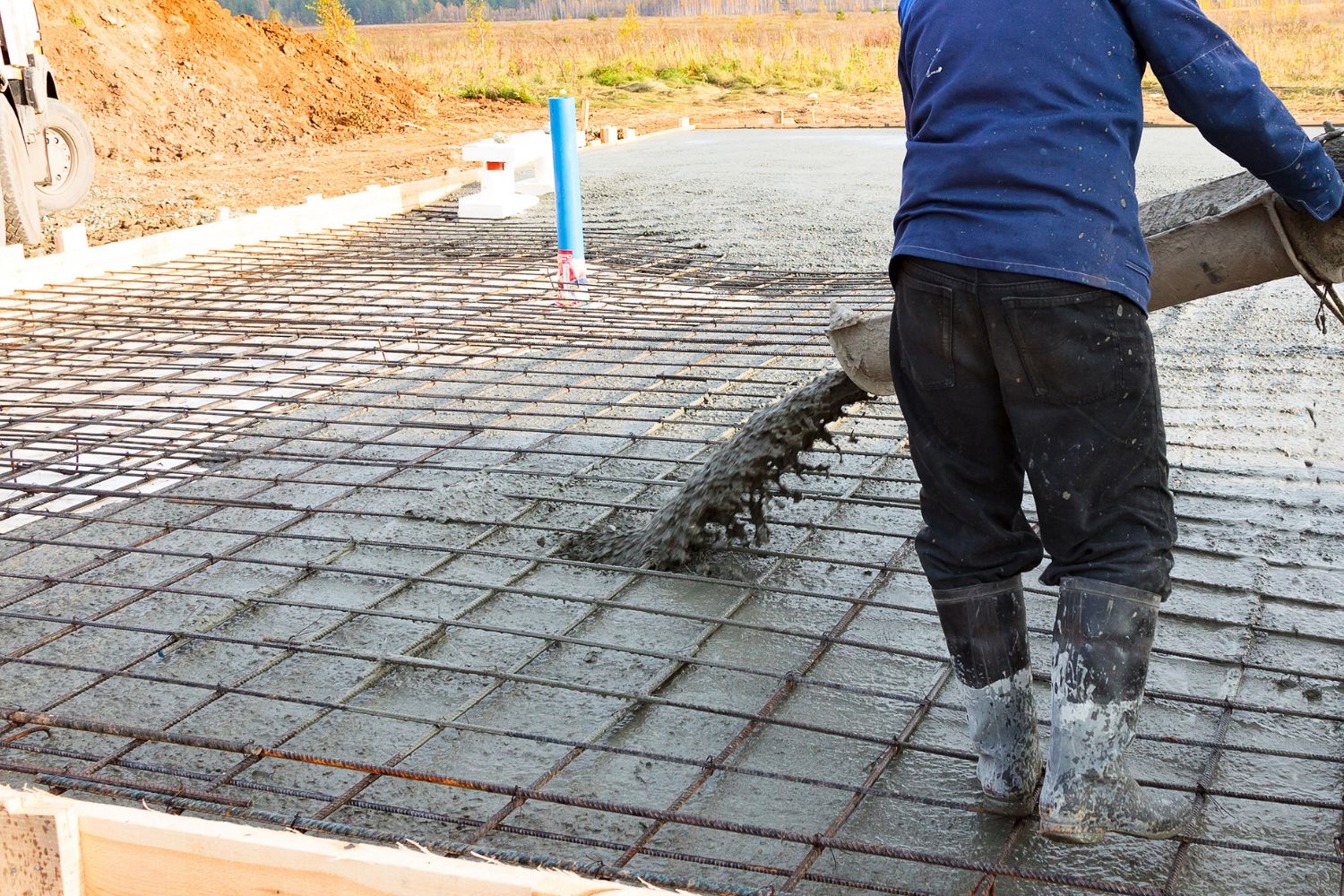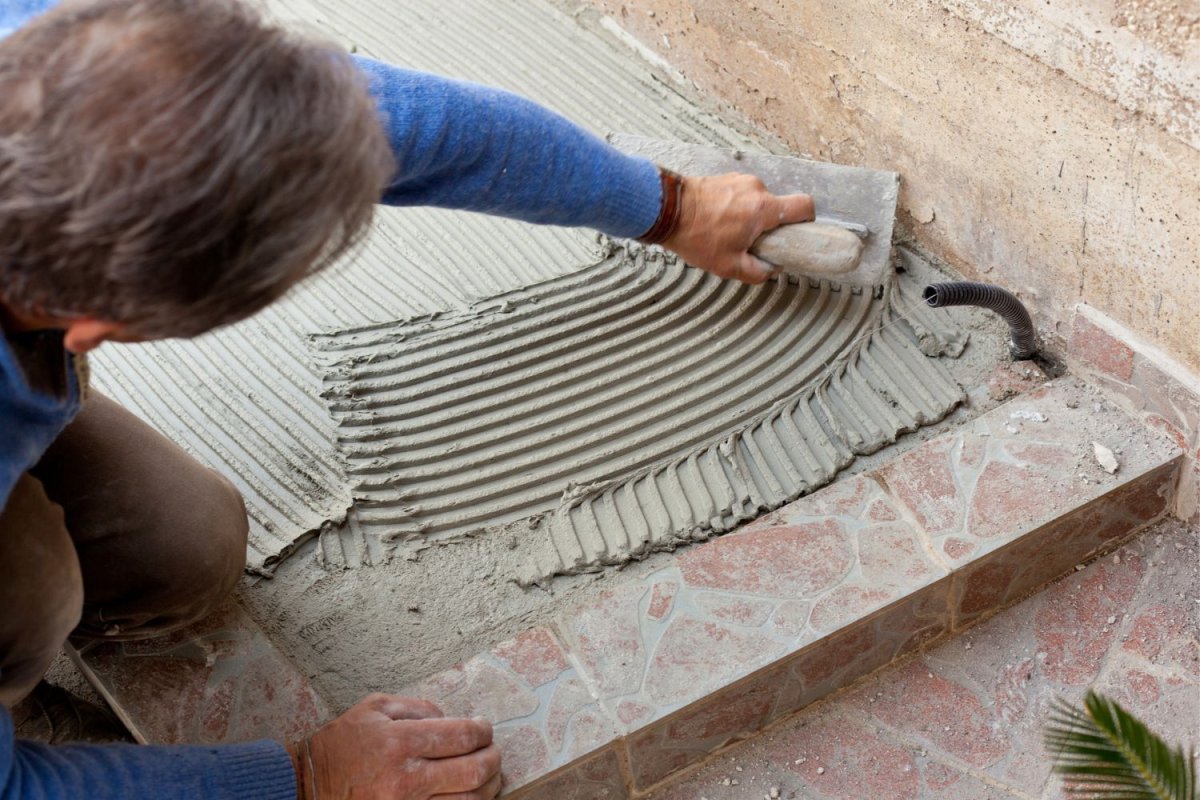We may earn revenue from the products available on this page and participate in affiliate programs. Learn More ›
- Typical Range: $100 to $200
- National Average: $128
When it’s time to install or repair a concrete patio, driveway, sidewalk, or stairs, homeowners are usually concerned about the price of concrete per yard. There are several factors that go into concrete cost by the yard, including concrete thickness, the size and location of the area that needs to be covered, the type of concrete, the strength of the concrete, and the amount of concrete needed. According to Angi and HomeAdvisor, concrete cost per yard ranges from $100 to $200, with homeowners paying $128 on average. Concrete is typically sold by the cubic yard. The more material that’s needed, the more homeowners can save on the cost of per-yard concrete prices. Hiring a professional concrete company can save time and headaches compared to mixing and managing the concrete as a DIY project. When homeowners are attempting to estimate the cost of concrete, it’s beneficial to know about the available types of concrete, delivery fees, prep work, and any additional cost considerations, such as short-load fees, installation, old concrete removal, landscaping options, and customizations.
Labor pricing can vary according to the scope of the project, the amount of prep work that’s needed, soil condition, and design choices. Be aware that labor can be more expensive in more densely populated urban areas than in suburban or rural areas of the country. This guide will examine the individual factors that influence the cost of concrete per yard, the different types of concrete, the benefits of installing concrete, and important questions to ask a concrete professional.
How to Calculate Concrete Cost per Yard
To price concrete per yard, multiply the overall square footage of the area by how deep the concrete will be and convert it to cubic yards. If a 10-foot by 10-foot area will have a depth of 6 inches, that equals to 100 square feet multiplied by 0.5 feet for a total of 50 cubic feet. Divide 50 cubic feet by 27, which is the total number of cubic feet in a cubic yard, and it equals 1.85 cubic yards. It’s always recommended to round up by 10 percent for any extra concrete that’s needed for the project. Keep in mind that not all types of concrete have the same cost per cubic yard.
Factors In Calculating Concrete Cost per Yard
How much is a yard of concrete? That depends on several factors. Prices can differ from the national average due to concrete type, psi rating, delivery distance fees, delivery day, labor costs, and geographic location.
Concrete Type
Choosing the right type of concrete for the job is an important step in the process. How much concrete is needed and how long it takes for the concrete to be delivered will also impact concrete cost by the yard. Some homeowners choose ready-mix, pre-mix, reinforced, or precast concrete for their projects. Each type of concrete is discussed in more detail below.
PSI Rating
A significant difference in types of concrete is the overall strength of the material. Concrete strength is measured in pounds per square inch, or psi. Concrete psi ranges from 2,500 to 5,000. The higher the psi, the more expensive and stronger the concrete will be. Load-bearing structures, such as basements, driveways, and support piers, typically require a higher psi-rated concrete mix than non-load bearing structures, such as sidewalks, walkways, and patios. Load-bearing structures need concrete with a psi of 3,000 to 5,000, while non-load bearing areas can get by with concrete that has a psi of 2,500 to 3,000. Here is the concrete cost by yard for some common psi concrete mixes.
- 3,000 psi concrete: $100 to $115 per cubic yard
- 3,500 psi concrete: $110 to $123 per cubic yard
- 4,000 psi concrete: $118 to $130 per cubic yard
- 4,500 psi concrete: $128 to $138 per cubic yard
- 5,000 psi concrete: $135 to $138 per cubic yard
Delivery Distance
Some concrete companies have a set delivery radius and will charge an extra fee for every mile past that distance. A typical charge is $10 per load but some companies will charge between $20 and $40 per load in fuel surcharges for long-distance deliveries. Homeowners should always double-check with their delivery company for delivery or fuel surcharge fees.
Delivery Day
It’s common for concrete companies to charge extra for concrete deliveries on the weekend or during a holiday. An additional charge of $8 per cubic yard is not uncommon, so be sure to ask about potential additional delivery day fees to avoid a surcharge.
Labor
Labor for installing concrete is usually charged by the square foot and not the cubic yard. Labor costs for pouring concrete typically ranges from $8 to $18 per square foot, but labor prices can vary significantly due to the size of the project, old concrete removal, and design preference.
Geographic Location
Keep in mind that geographic location impacts the price of concrete. Concrete companies will charge more to deliver concrete in colder climates, since they use hot water to heat the concrete. Winter deliveries usually result in an additional charge of $8 per cubic yard. Those that live on coastal islands can expect to pay an additional $55 per cubic yard for barge and ferry fees. Look online for more budget-friendly concrete pricing, but keep in mind delivery fees may not be worth it.

Additional Costs and Considerations
When asking the question “What is the price for concrete per yard?” homeowners should inquire about any additional costs and considerations that can add to the overall project price. These can include short-load fees, concrete prep and installation, concrete removal, landscaping, and additional customizations.
Short-Load Fees
Short-load fees usually add an extra $40 to $60 per cubic yard. Since concrete is basically mixed according to the unique measurements of the project, the amount of concrete may not fill up the concrete truck. Concrete companies lose income when they mix and deliver a truck that’s not completely full. On occasion, some companies will charge a flat short-load fee between $60 and $110, but customers should always check the short-load policy before they sign up for a concrete delivery service. For deliveries that are less than approximately 10 cubic yards, expect to pay a short-load fee.
Concrete Installation
Before the concrete can be poured, the appropriate prep work needs to be done. Depending on the area and the needs of the project, excavation, grading, building forms, laying a sub-base, and positioning reinforcements may be needed.
- Excavation. Before any concrete can be poured, the area needs to be excavated. Leveling and clearing the area costs between $50 and $200 per cubic yard, or between $200 and $6,000 per acre for larger spaces.
- Grading. Having a base under the concrete that’s properly graded ensures sufficient water drainage and eliminates the risk of cracking. Getting an area graded usually costs about $60 per hour for a professional and a tractor. Expect to pay between $1,150 and $3,680 for grading an area for a house foundation.
- Concrete forms. Before concrete is poured, a form needs to be built that is made from plywood, nails, stakes, and form oil. Edge forms for concrete sidewalks and driveways run from $2 to $3 per linear foot, and forms for retaining walls, building walls, and foundation walls range from $2.50 to $6 per square foot. Labor to remove and clean the concrete bracing and forms cost from $0.30 to $0.60 per square foot. It is common for a concrete company to add a 20 percent waste fee for bracing and a 5 percent to 10 percent waste fee for plywood.
- Subbase. The area underneath the concrete needs to be stable. Before the concrete is poured, a layer of sand and gravel must be laid and tamped down to minimize the likelihood of shifting. This costs from $10 to $20 per cubic yard.
- Reinforcement. Concrete reinforcement prevents cracking and improves poor soil conditions. To make the concrete structurally sound, wire mesh can be added to the mixture at a price of $0.15 to $0.30 per square foot, and even extra support can be added with rebar, which costs from $0.30 to $0.50 per linear foot.
Average concrete installation costs can vary due to the quality of materials and the purpose of the project. Here are some common concrete installation projects and their average costs. If the area where the concrete is to be poured is difficult to access, prepare to pay extra.
- The cost for a basic concrete slab ranges between $4.34 and $7.73 per square foot.
- Building a concrete patio costs an average of $4.40 to $16 per square foot.
- Pouring a new concrete foundation typically costs homeowners between $4.50 and $14 per square foot.
- The cost for a concrete driveway ranges on average from $6 to $14 per square foot.
- Choosing stamped concrete for additional customization will cost around $9 to $16.25 per square foot.
- Installing reinforced concrete can cost between $9.29 and $10.04 per square foot.
Concrete Removal
If an area that needs new concrete has existing concrete, it will need to be removed. The average price for concrete removal runs from $2 to $6 per square foot.
Landscaping and Customizations
Many homeowners choose to landscape around their newly poured concrete areas for a polished look. Adding flower beds, sod, retaining walls, mulch, trees, and shrubs are all popular ways to create a welcoming space. Here are some of the most popular landscaping ideas and their average costs.
- Sod installation: $0.87 to $1.76 per square foot
- Walkway installation: $10 to $20 per square foot
- Tree or shrub installation: $30 to $3,000
- Mulch installation: $40 to $115 per cubic yard
- Flower bed installation: $650 to $3,000
- Retaining wall installation: $4,030 to $8,720
- Gazebo installation: $5,370 to $9,030
Options to customize concrete include staining or stamping for a unique look. These special finishes can range from $2 to $18 per square foot, depending on the complexity of the design. A less expensive option is staining concrete with a single color, which is applied to the surface of the concrete in conjunction with a sealant to protect it. More intricate staining designs that incorporate several colors and border designs are more expensive. Stamped concrete can take on the look of brick, tile, or stone; have a smooth surface; or display varied shapes and patterns.

Types of Concrete
How much is a yard of concrete? That depends on the type. There are four specific types of concrete, each with its own characteristics, benefits, and price ranges.
Ready-Mix
Ready-mix concrete runs from $100 to $200 per cubic yard and it’s mixed in batches of 10 cubic yards or more. It’s common for additional fees of about $9.50 per mile to be charged for delivery distances greater than 20 miles. Ready-mix concrete is mixed at the concrete plant and delivered in a concrete truck. The truck driver has about 90 minutes to deliver the material before it sets and the concrete needs to be poured immediately upon delivery. Some additional fees for ready-mix concrete are $96 per truckload for special finishes, $31 to $170 per cubic yard for color, and $45 to $108 per cubic yard for custom stamping finishes.
Pre-Mix
Pre-mix concrete ranges from about $4.50 to $27 per bag, depending on the type of concrete. Bags of pre-mix concrete can be purchased from local home improvement or hardware stores. This type of concrete sets up fast and works well for small projects around the home. Certain types of pre-mix concrete require a concrete mixer to cure the cement, so be sure to double-check the bags in advance. Homeowners are advised that while bags of pre-mix concrete may seem more budget-friendly than other options, multiple bags are needed to cover a cubic yard. It’s important to weigh the cost of having concrete delivered against the cost of buying multiple bags and mixing and pouring it on your own. The following bag sizes of pre-mix concrete are available along with the number of bags needed to cover a cubic yard.
- 50-pound bag of pre-mix concrete: 70 bags needed to cover 1 cubic yard
- 60-pound bag of pre-mix concrete: 60 bags needed to cover 1 cubic yard
- 70-pound bag of pre-mix concrete: 50 bags needed to cover 1 cubic yard
- 80-pound bag of pre-mix concrete: 45 bags needed to cover 1 cubic yard
- 95-pound bag of pre-mix concrete: 40 bags needed to cover 1 cubic yard
Here are the different types of pre-mix concrete and the average cost per bag.
- 50-pound bag of light-weight concrete: $4.49 per bag
- 50-pound bag of fast-setting concrete: $4.57 per bag
- 60-pound bag of mortar mix: $5.57 per bag
- 80-pound bag of high early strength cement: $6.29 per bag
- 94-pound bag of Portland cement I and II: $11.50 per bag
- 70-pound bag of masonry cement: $11.50 per bag
- 94-pound bag of plastic cement: $12 per bag
- 94-pound bag of white cement: $26.90 per bag
Portland cement is commonly used in mortar, concrete, grout, and stucco. Some types resist water damage and others will dry at different rates. The differences rely on the amount of aggregates and other materials mixed into the base.
Reinforced
Sometimes concrete needs to be reinforced to add extra support and prevent cracking. Reinforced concrete costs more than a standard concrete slab. The wire mesh can run from $0.15 to $0.30 per square foot, and rebar costs between $0.30 and $0.50 per linear foot. It’s recommended that homeowners talk with a concrete professional to see if their project needs reinforcement.
Precast
Some homeowners decide to use precast concrete or cast in place (CIP) concrete. Precast concrete is poured into a mold at the concrete plant and then shipped and delivered to the installation location. CIP concrete is poured into a mold at the installation location. The end cost of precast concrete is usually more than the cost of CIP concrete, but according to the National Precast Concrete Association (NPCA), the total cost of ownership for precast concrete ends up being 45 percent cheaper in the long run because it’s quicker to deliver, easier to install, and can be higher quality of produced in a certified plant.

Benefits of Installing Concrete
Concrete can be used in all types of projects. It’s durable, fire- and water-resistant, and low-maintenance. Homeowners who choose to use concrete in and around their home can enjoy many benefits.
Low Up-Front Cost
Concrete has a lower up-front cost than other building materials, such as paving stones. Driveways, sidewalks, patios, and walkways made of concrete require only 30 percent of the maintenance that asphalt needs over the course of 50 years.
Widespread Availability
The major ingredients that go into making concrete are water, aggregates, and cement. The fact that these products can be locally sourced in areas all around the world makes concrete readily available.
Low Maintenance, Durability, and Longevity
Concrete requires minimal maintenance, and the material is less prone to daily wear and tear than other materials. Concrete is typically a long-lasting choice for driveways, patios, and sidewalks. It’s durable and can last as much as three times as long as other types of building materials, such as paving stones.
Load-Bearing Capacity
After the curing process, concrete is a strong load-bearing material. A concrete driveway can support the weight of cars, trucks, and RVs, while a concrete foundation can support the entire weight of a house, its contents, and the people inside.
Eco-Friendliness
Since concrete is made from naturally occurring materials, it can be broken down and recycled when it’s no longer needed. It’s typically recycled as part of the sub-base material in roadbeds, shoreline protection, parking lots, retaining walls, and more. Concrete can also be mixed in the exact amounts needed for the project to reduce construction waste.
Aesthetic Options
Concrete can be customized to look like brick, wood, marble, stone, tile, and more. The material lends itself to stain and color to create intricate border designs and custom patterns. Concrete can be formed into any shape for practically any purpose.

Concrete Installation: DIY vs. Hiring a Professional
It may be tempting for homeowners to install concrete on their own to save money on labor costs, but concrete installation is a difficult DIY project. Concrete requires specialized tools and machinery for proper installation. While some small household projects could be completed with a wheelbarrow and not much more, keep in mind that to cover 1 cubic yard, homeowners will need at least forty 95-pound bags of concrete, which can be difficult to transport with the average household vehicle. It’s recommended that homeowners get the concrete professionally delivered and poured to save time and avoid any problems that may arise from doing it themselves. Homeowners can enjoy a more consistent result, perfect material measurement, and peace of mind that the opportunity for cracks is minimized when the project is completed by a professional.
How to Save Money on Concrete Cost per Yard
Budgeting for concrete cost per yard can be daunting, and the additional costs associated with the project can quickly add up. Opting for the cheapest type of concrete is one way for homeowners to save money, but there are other ways to save without compromising on quality and the desired features.
- Get multiple estimates. Get at least three estimates from reputable concrete companies in the area.
- Buy in bulk. Ask friends and neighbors if they have any projects that require concrete or if they want to split the price to replace the sidewalks in the neighborhood. Ask local suppliers if they offer bulk concrete discounts.
- Go local. Use locally sourced products to reduce transportation and delivery costs.
- Do some of the prep yourself. Depending on available tools, your experience, and the time and effort you’re willing to put into the project, you may be able to excavate, grade, or frame the area before a professional pours the concrete. Be sure to ask concrete professionals if they offer any discounts.
- Buy salvaged materials. As long as the recycled material is clean and strong enough for your project, a less expensive option may work well.
Questions to Ask About Concrete Installation
When you are preparing to buy concrete by the yard, many questions can arise. Asking the right questions about concrete cost per yard can help minimize miscommunication and find the right concrete professional for your home. Here are a few questions to ask to alleviate any concerns.
- Do you have worker’s compensation and liability insurance?
- Are you licensed and bonded?
- What types of concrete projects have you completed?
- Do you have references?
- How much experience do you have?
- Can you show me examples of concrete work that you’ve done?
- How much does a yard of concrete cost?
- What kind of customizations do you offer?
- How soon can you start the installation?
- How long will the installation take?
- Do I need a permit for the concrete installation?
- Who will be managing the project?
- Who will be prepping the location and pouring the concrete?
- What guarantees and warranties do you offer?
FAQs
For homeowners who are still unsure about concrete cost per yard and concrete installation, here are a few frequently asked questions to help guide their decisions.
Q. Where do I buy concrete?
For small projects, bags of pre-mix concrete can be purchased from a local home improvement or hardware store. For more extensive products, a concrete company can mix, deliver, and pour the concrete directly on the property.
Q. How many cubic yards of concrete are in a truck?
A fully loaded concrete truck can hold between 8 and 10 cubic yards of concrete.
Q. What is the cheapest way to buy concrete?
Buying bags of pre-mix concrete for approximately $4.49 each and renting a concrete mixer for about $120 per day is the cheapest way to buy concrete.
Q. What is the minimum amount of concrete for delivery?
Usually the minimum amount of concrete available for delivery is 1 cubic yard. Expect to pay short-load surcharge fees for such a small amount.
Q. How do I order concrete?
Get in touch directly with a concrete company to order concrete. Be sure to let the company know the location of the pour and the type of project.
Q. How long does it take to pour concrete?
Concrete has a limited pour time, which is about an hour. Within that time frame the concrete needs to be poured, spread out, and leveled before it begins to set. Depending on the type used, concrete can dry in 24 hours.
Sources: Angi, HomeAdvisor, HomeGuide, Everything About Concrete, BuilderSpace.com, Decks.com


